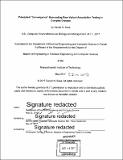Principled "convergence" non-coding rare variant association testing in complex disease
Author(s)
Sosa, Daniel N.
Download1017489608-MIT.pdf (3.825Mb)
Other Contributors
Massachusetts Institute of Technology. Department of Electrical Engineering and Computer Science.
Advisor
Manolis Kellis.
Terms of use
Metadata
Show full item recordAbstract
Although many genetic loci pertinent to complex diseases have been identified and despite the fact that complex diseases remain an immense burden to healthcare globally, many details about the mechanism of these diseases are still unknown. Thus far, genome-wide association studies (GWAS) have only explained a small proportion of disease heritability, indicating that there is a large number of additional loci that contribute to complex diseases like type 2 diabetes (T2D), which is the primary case study in this work. We overcome some of the limitations of rare variant studies by conducting weighted aggregate association tests in a framework we call "Convergence". We compare potential cell type specific regulatory loci assigned to genes, which serve as the basis for grouping variants and integrated predictors of functional consequence of variants, which serve as variant weights. We demonstrate that this methodology is able to detect significant association to T2D for genes relevant for body weight homeostasis, adipocyte proliferation, and inflammation. As a result, this work provides a principled framework for improving the efficacy of RVAS by successfully converging the abundant epigenetic information available to understand complex disease.
Description
Thesis: M. Eng., Massachusetts Institute of Technology, Department of Electrical Engineering and Computer Science, 2017 Cataloged from PDF version of thesis. Includes bibliographical references (pages 29-31).
Date issued
2017Department
Massachusetts Institute of Technology. Department of Electrical Engineering and Computer SciencePublisher
Massachusetts Institute of Technology
Keywords
Electrical Engineering and Computer Science.